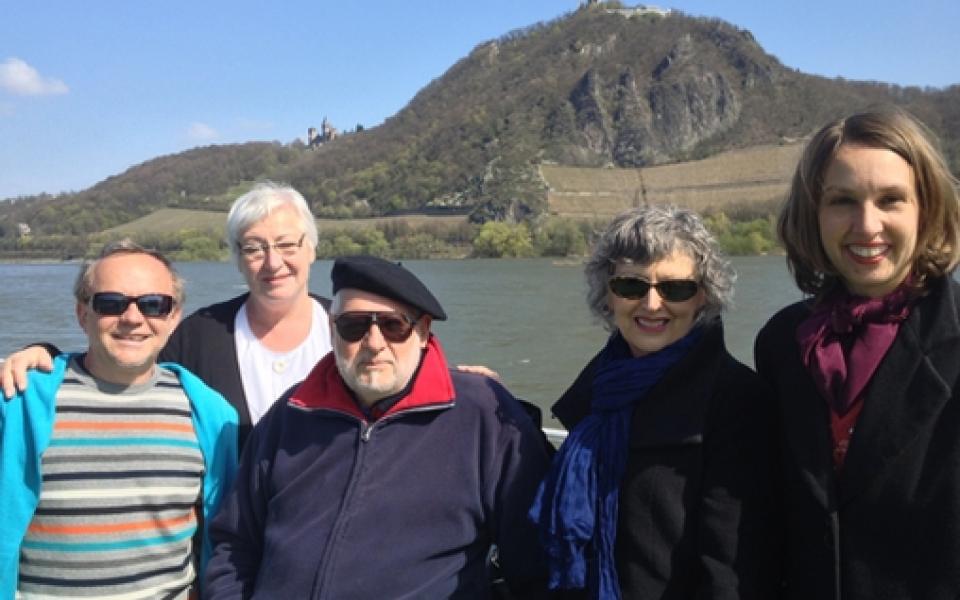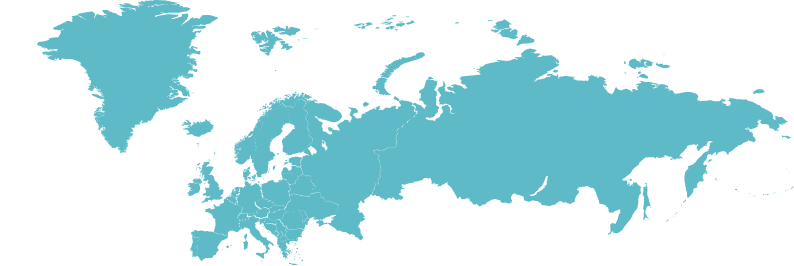
PHOTO: Vjekoslav Saje, right, poses with past and present members of the URI team
During Charles’ travels for URI, he met Vjekoslav Saje, whom he has called “a charismatic leader with a contagious passion.” With a background in peacebuilding and conflict resolution, Vjeko started his Cooperation Circle, Balkan as a Soul Bridge, to contribute to rebuilding a broken and divided society after the war in Bosnia and Herzegovina.
Vjeko comes from a multi-cultural family of Christians and Jews in Sarajevo, a city where Jews, Christians and Muslims have lived in harmony for five centuries. In July 1995, Vjeko, his wife (a Muslim) and their daughter were witnesses to the slaughter of more than 8,000 civilians in an ethnic cleansing campaign in Srebrenica, a town in Bosnia and Herzegovina.
Nearly two decades later, the divisions created during the war continue to be challenging and the reconciliation process is slow. “The situation in Bosnia is still undefined and tense, the economy is fading, corruption is blooming, tribal passions are growing,” Vjeko observes.
“All these factors are creating a difficult environment for normal citizens, young people, and intellectuals," he says. "The struggle for human rights has been reduced only to ethnic or religious issues, and the protection of their constituent aspirations. Minorities and others, including myself, have been marginalized.”
Vjeko's Cooperation Circle - Balkan as a Soul Bridge - organizes training workshops in problem solving and communication skills, helps direct participants to projects and initiatives like URI and provides support and recommendations to help youth get into universities and find jobs.
Recently, Balkan as Soul Bridge brought together a group of Serbs and Muslim Bosnians at a memorial for victims of the massacres to provide a platform for reconciliation. Through storytelling and inter-religious dialogue, both sides had an opportunity to speak about the atrocities committed during the genocide.
One Muslim Bosnian mother, Hatidza Mehmedovic, described how she was separated from her husband and two sons, and how she hoped for many years that she would at least find their remains. Mrs. Mehmedovic lost 40 members of her extended family, and she now lives alone. As she was speaking, a young teenage boy approached her and embraced her, apologizing on behalf of his own people, knowing that some of them were participants in the massacre. After a moment of silence, Mrs. Mehmedovic kissed the young man, and said that her feelings for him were the same as if he was her own son. She acknowledged that she did not want to be driven by hatred.
“URI provides an “honest, open, unbiased and embracing approach to all traditions, religions and cultures in the world [and gives] me hope that my country and my region have a chance to restore the same values, as we used to have many centuries ago,” says Vjeko. “I also realized that our experience of multi-religious society and its survival during the war could inspire other people to try to build the same.” Vjeko was elected this past April to the URI Europe Board of Directors and he continues to work with URI Europe to increase URI’s presence in the Balkans.
